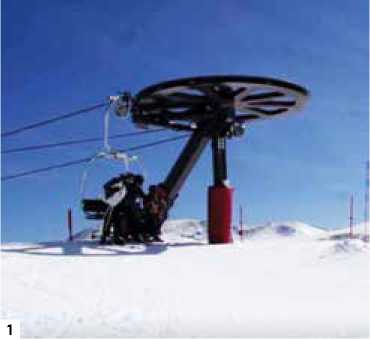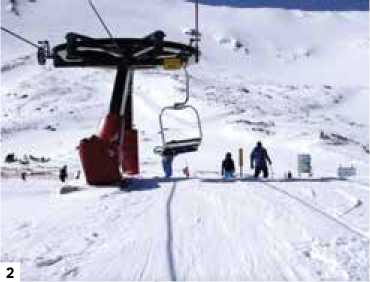The No-duty Doctrine for Ski Area Operators After Redden
| Publication year | 2023 |
| Pages | 54 |
July 2023

Colorado Ski Law in the 21st Century-Part 2
BY JIM CHALAT, MIKE THOMSON, AND HUNTER HATTEN
This is the second installment of a two-part article discussing the history of ski law in Colorado and how Redden v. Clear Creek Skiing Corp., decided on December 31, 2020, has significantly changed the duties imposed on ski area operators.
In Redden v. Clear Creek Skiing Corp., the Colorado Court of Appeals held that a skier's signed exculpatory agreement and waiver language on the back of a lift ticket waived the skier's statutory negligence claims under the Colorado Ski Safety Act (SSA) and the Passenger Tramway Safety Act (PTSA).[1] The Redden case overruled 40 years of precedent set by Phillips v. Monarch.2 In Phillips, the court of appeals held that the statutory duties of care owed by a ski area operator to a skier could not be modified or extinguished by a lift ticket waiver or an exculpatory agreement.
All Colorado lift tickets and passes now include waivers or exculpatory agreements, whether incorporated through an Internet purchase, a written agreement from the rental or ticket window, the peel-off portion of the ticket, or small font print on the back of the lift pass. Except for a case where a court might find that the waiver did not encompass the precise risk that caused either an injury or a death, the Redden decision effectively immunizes ski area operators from all claims. Although a later court decision or legislation could clarify, limit, or reverse Redden, the decision renders the SSA3 and the PTSA[4] to be dead letter for the majority of individuals injured as a direct result of a ski area operator's violation of the SSA's and PTSA's safety standards. Part 2 of this article describes and analyzes Redden, examines data concerning skier injuries and the economic impact of skiing, reviews how other jurisdictions construe exculpatory waivers in the ski resort context, and considers how this area of law may evolve post- Redden.
Unpacking Redden
Below is a detailed look at the facts, a summary of the trial court decision, and an analysis of the majority and dissenting opinions in the court of appeals decision in Redden.
Factual Background
Loveland Ski Area was opened in 1936 as the Loveland Ski Basin. Today, the ski area includes the Basin and the lower complex of two lifts referred to as Loveland Valley.[5] Clear Creek Skiing Corporation has operated the Loveland Ski Area since 1972.[6] For simplicity, this article refers to the defendant as "Loveland."
Charlotte Redden began skiing in Colorado in the 1980s. Redden was an intermediate skier and had taken ski lessons at Loveland, Keystone, Steamboat, and Arapahoe Basin. In September 2016, Redden purchased a Loveland Ski Area "4-Pak" ticket for the 2016-17 season. Exculpatory language appeared on the backs of those tickets.[7] Redden had also signed a release agreement when she purchased ski boots at the Loveland ski shop in April 2016.
The Ptarmigan lift at Loveland was installed in 2016. It is a fixed grip triple chair manufactured by Leitner-Poma that serves beginner and intermediate terrain. The lift travels 3,085 linear feet at a rope speed of 7.9 feet per second. The chairs are 45 feet apart. Colorado Passenger Tramway Safety Board (PTSB) acceptance test data for the Ptarmigan lift indicates that at full speed, a normal stopping distance for the lift is 18 feet, less than half the distance between two chairs. At normal operating speed, there is a six-second interval between chairs. Near the unloading board, there are signs affixed to the final two towers warning approaching passengers to "prepare to unload" and "keep tips up."[8]
In clear weather, the crest of the unloading ramp is visible from two chair lengths away. The "unload here" sign is at the break-over point of the ramp, just downhill of the top station bullwheel and from which the lower aspect of the unloading ramp first comes into view.
The Ptarmigan unload area is pictured in image 1. The yellow, vertical "unload here"


sign is seen just behind the chair from which the skiers are unloading.
At the unloading marker, the attendant's station is to the passengers' right. The attendant's station offers an unrestricted view of the entire unloading ramp and contains a lift operations control set that can slow, stop, and restart the lift.[9]
The view as a passenger approaches the unloading area of the Ptarmigan is shown in image 2.
In March 2017, Redden was skiing at Loveland on one of her 4-pak tickets. She boarded the Ptarmigan lift, and had the inside, left seat. One other passenger was on her chair, sitting on the far right. As Redden's chair came to the "unload here" sign, she saw that a passenger on a chair ahead had fallen on the ramp below the break-over of the ramp. The fallen passenger was ahead of Redden on the unloading ramp. According to the lift attendant, he slowed the lift because a "patron was on the ground of the unloading ramp," and "the injured party tried to avoid the fallen person and fell herself."[10]
According to her complaint, however, as Redden's chair approached, she couldn't see the previous passenger who had fallen on the ramp. She alleged that the lift had not been slowed. As Redden stood up, her path was blocked and she was unable to navigate around the fallen skier on the unloading ramp. The chair on which she had been riding began to swing around the bullwheel and caught up with and struck Redden, seriously injuring her right hip.
Redden's Claims
In January 2018, Redden filed suit in Clear Creek County. In her complaint, Redden asserted statutory negligence claims founded on the SSA and also alleged a common law claim under the highest duty of care doctrine.[11]
Her statutory negligence claim asserted violations of the SSA, specifically, CRS § 33-44104(2), which provides that a ski area operator's violation of any PTSA requirement or any rule promulgated by the PTSB shall, to the extent such violation causes harm, constitute negligence on the part of the ski area operator.[12]
To support her statutory negligence claims, Redden relied on the American National Standards Institute's (ANSI) B77 safety requirement's provision,[13] which the PTSB adopted and promulgated as a regulatory rule. The rule requires a lift attendant to assist passengers as they unload a chair and in other situations, and to choose "an appropriate action," which may include, without limitation, stopping the lift.[14]Relying on section 104(2) of the SSA, Redden alleged that Loveland violated this PTSB regulation and that its violation caused harm, thus giving her a clear statutory negligence claim.
At the factual heart of her claim, Redden argued that the lift attendant merely needed to stop the lift and assist the skier ahead of Redden off the ramp to clear the ramp, which would have avoided the pileup and allowed Redden to unload onto a clear ramp, avoiding injury.
Trial Court Decision
After discovery, Loveland moved for summary judgment. It argued that the rental agreement's and ticket's exculpatory waivers barred Redden's claims. The trial court granted summary judgment. Its order relied heavily on the Tenth Circuit's analysis in Brigance v. Vail Summit Resorts, Inc.,[15] which held that "exculpatory agreements do not conflict with Colorado public policy merely because they release liability to a greater extent than the statutory inherent risk bar on claims set out in the SSA."[16] The trial court found, based on Jones v. Dressel,[17] which identified four factors courts must consider to determine exculpatory agreements' enforceability, that Loveland's waivers were enforceable absent any specific legislative provision barring exculpatory agreements from preempting the SSA's statutory duties. Redden appealed.
Colorado Court of Appeals Decision
On December 31, 2020, the court of appeals affirmed the summary judgment by a 2-1 vote. Judge Dailey wrote the majority opinion; Judge Hawthorne joined. Judge Davidson concurred in part and dissented in part.
Majority opinion. The majority opinion notes at the outset that "[s]kiing is one of our state's biggest tourist activities and supports not only the ski area operators but also businesses that provide services (e.g., food, lodging, entertainment) for skiers. But it is also a common source of injury."[18]
The majority then recognized the general doctrine that exculpatory agreements purporting to shield a party from liability for its own simple negligence are disfavored. It explained that exculpatory agreements are therefore closely scrutinized under four factors set out in Jones: (1) the existence of a duty to the public, (2) the nature of the service performed, (3) whether the contract was fairly entered into, and (4) whether the intention of the parties is expressed in clear and unambiguous language.[19] The court described the first two factors as focusing on public policy questions, including whether the service provided is of great importance to the public or is instead recreational.[20] The court explained that the third and fourth factors focus on the agreement's "fairness and clarity."[21]
The majority assumed that Redden was engaged in a recreational activity. Relying on Bauer v. Aspen Highlands Skiing Corp.,[22] the court noted that "[a]lthough skiing is a recreational activity enjoyed by many, by definition and common sense, it is neither a matter of great public importance nor a matter of practical necessity."[23] Redden did not challenge the district court's conclusion that the waivers passed scrutiny under the first two Jones factors, and the court of appeals agreed that such a challenge would have no basis.[24]
With respect to the third factor, the court found it important that Redden had signed...
To continue reading
Request your trial
